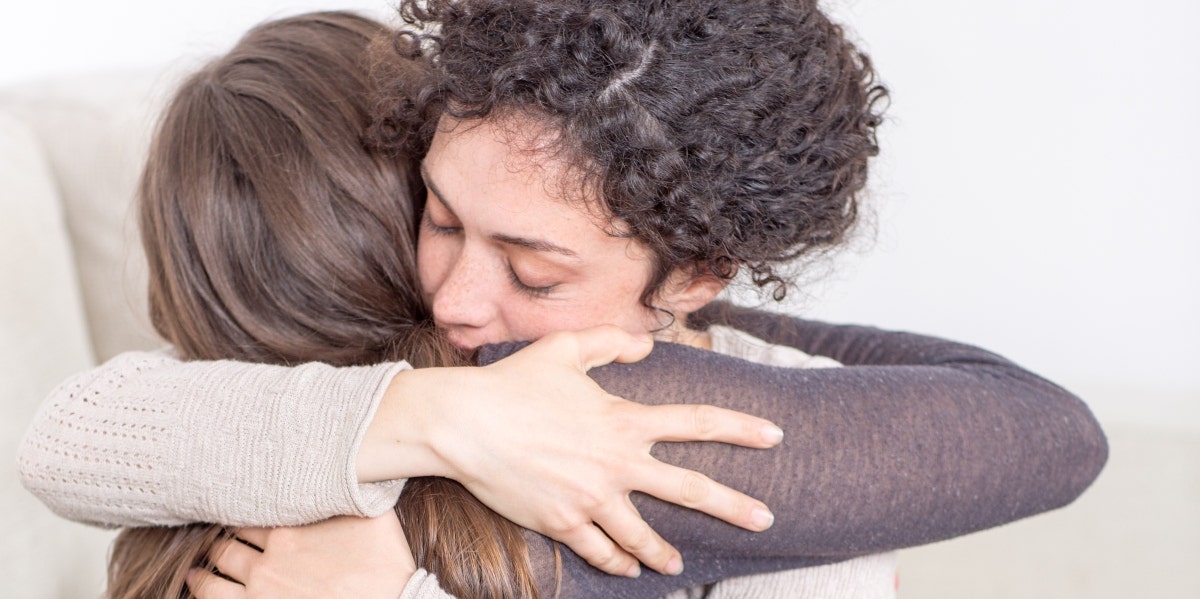Grief Etiquette 101: Is It Rude To Ask How Someone Died?
Tips and guidance for helping others through grief and loss.
 Adam Gregor / shutterstock
Adam Gregor / shutterstock The sympathy card you meant to mail sits on your desk, unsent, because you just don’t know what to say. You default to a text or email saying, "I’m so sorry. Let me know if you need anything" and then wonder, was that the right thing to do?
You don't know what the protocol is anymore. You don't know if it's rude to send a card or just to text, if it's rude to ask how they died, if it's rude to pry.
There are many more ways of communicating than ever. Yet, this can also cause confusion around how to properly respond in various circumstances and what to say when someone dies.
Is it rude to ask how someone died?
It’s difficult to be in a state of not knowing. Uncertainty around the whys and hows of a death can trigger anxiety.
The desire to ask what happened can also stem from a need to protect ourselves from the same harm, especially if it was a health-related passing or someone relatively young has died.
In finding out details of a death, you may hope that you’re connecting more deeply with the person suffering. It’s natural to be curious about how someone died, but it’s not usually appropriate to ask what happened or how they died.
Grief Etiquette: Always respect others’ privacy first and hold off on asking questions directly related to how the loved one died if the information is not offered first.
Everyone goes through the grieving process differently and some people may not be ready to talk about a loss, even if a significant amount of time has passed.
Trust that your presence, empathy, and willingness to listen can offer much-needed solace. And if the time is right, a grieving individual may offer more information.
When someone asks you why someone has died.
If you’re in the position of being asked why someone has died, you may feel pressured to talk when you’re not ready or to reveal details you just don’t feel comfortable sharing.
Grief Etiquette: Give yourself permission to privacy. You don’t need to talk about the death of a loved one if you don’t feel ready. You can say, "I know you care a lot. I’m just not ready to talk about that right now."
Can you talk about someone who died?
Even when a close friend or family member loses someone, it can feel unclear whether or not to bring up the person who died. You may worry about being insensitive or saying the wrong thing.
Stories and memories about the person who died can be comforting to someone grieving.
Grief Etiquette: Use your intuition. Timing is key. You can start by asking for permission to share your memory or story — "I just had a nice memory about Carol. Is it okay if I share it with you?"
When you find out about a death through social media.
Scrolling through your social media feed, you notice a friend has announced the death of a loved one and hundreds of short comments have popped up underneath.
Is it enough to leave another, "Thinking of you"?
What else should you do?
Grief Etiquette: If posting a comment on social media feels too personal or public or you're afraid it lacks empathy, you don’t need to leave a comment.
Do save longer messages for direct private messages. A phone call (even leaving a voicemail) or sending a sympathy card are always appropriate options.
Here are some funeral etiquette do's and don'ts.
Do be thoughtful about your attire. While gone are the days of black hats and face veils, dressing up is a form of respect for the grieving family.
Do share your condolences in person, even if it's just a hug or a handshake.
Do share memories of the deceased if they seem appropriate.
Don't text, check your email, or scroll through the internet on your phone. It can be difficult to remain fully present, but keep your phone on silent and out of view during a funeral or memorial service. If you must check your phone, excuse yourself politely.
Don't take photos unless asked.
It’s hard to ask for help when you’re grieving.
"Let me know if I can do anything to help" puts the ball back in the court of the grieving person to ask for help.
What to do instead: be specific with a helpful action and a concrete time to offer your help.
"I’d like to stop by with dinner this week. Is Tuesday a good time?"
When you just can’t find the words, and you notice that you're having trouble figuring out what to say to someone who's grieving, then simply offer your presence and openness without trying to problem-solve. This is a form of comfort and caring that often words alone can’t match.
Stephanie Lazzara is an ICF-certified holistic life and relationship coach. She helps her clients move through grief, loss, and heartbreak. She is also a certified yoga instructor and teaches yoga in Brooklyn, NY.
